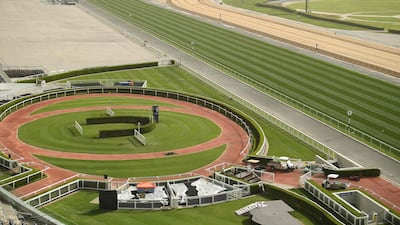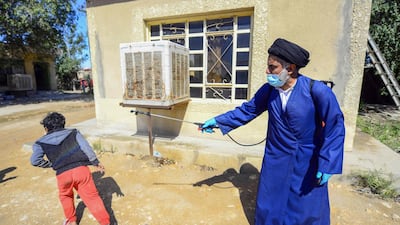Iraqi President Barham Salih urged the public to stay home, late Monday, as the country’s health system does not have the capability to cope with a major coronavirus outbreak.
The country announced new cases on Tuesday, taking the toll 316 infected individuals and 27 deaths. However, many believe the numbers are much higher.
“We must acknowledge that the infrastructure of our health system is not in the best condition,” Mr Salih said in an address to the nation.
He urged the public to “adhere to medical instructions and the need to stay home, except for the absolute necessity and the need to stand together in helping the most vulnerable”.
The outbreak has fuelled panic among Iraqis, who say the war-ravaged country's healthcare system cannot handle the epidemic.
“During the last couple of days we have witnessed a rise in number of those infected because of public engagement and the lack of awareness for the seriousness of this epidemic and its repercussions,” Mr Salih said,
“We must be cautious,” he added.
Authorities imposed a week-long curfew and lockdown across the country last Monday to prevent transmission of the virus.
On Sunday, it extended the curfew up to 11pm on March 28. The government also banned all travel between provinces.
Yet the public is still going out despite the introduction of these measures.
Mr Salih assured Iraqis that the government would meet the challenges ahead.
“Our people will prove, as before, that they will stand together against this danger and defeat it, there is no other choice,” he said.
Just as the country defeated ISIS and its reign of terror it will combat the outbreak of coronavirus, he said.
The president requested the public to unite and for the media to play a leading role in pushing the government to implement measures like rent reduction, loan repayments holidays and providing those in need with the necessary essentials.
“The pandemic has become a serious challenge to the entire world and requires the co-operation of all countries, international institutions, and peoples to ensure the health and safety of all humanity,” he said.
The president called on political parties to “show solidarity and to get the country out from the political turmoil."
Mr Salih appointed Adnan Al Zurfi, this month, as the country's new prime minister-designate in the latest bid to resolve a months-long political crisis.
Mr Al Zurfi has 30 days to form a government, which he must put forward for parliament’s approval.
If he were to succeed, Mr Al Zurfi would replace outgoing Prime Minister Adel Abdul Mahdi who resigned in late November following widespread mass anti-government protests.
The demonstrators called for an overhaul of the political system they view as corrupt, failing to provide them with basic services, and beholden to powerful neighbouring Iran.



















